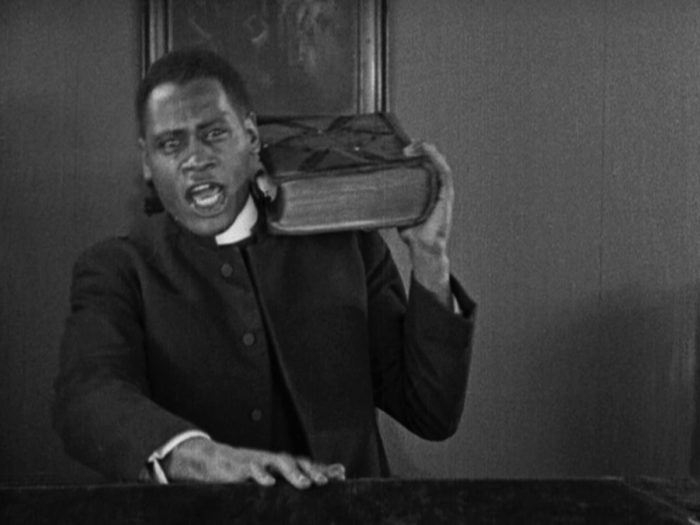
Body and Soul is a 1925 silent film about a young woman who is raped and abused by her small town’s reverend and chooses to run away because she knows no one will believe her. So it’s not a big surprise to read that the version of the film I watched on the Criterion Channel was heavily edited: director Oscar Micheaux cut nearly half its runtime in order to get a release. The director’s cut is long lost and I can’t find much information about Michaeux’s novel that he based the film on, but I’d bet that the original version was an even more powerful condemnation of the manipulative and hypocritical nature of those in power.
The film begins with Reverend Isaiah T. Jenkins (Paul Robeson) going through his daily routine, which appears to mostly be hustling the people of Tatesville, Georgia. On this particular day, he pressures the local speakeasy barkeep into giving him his best booze for free, then shakes him down by threatening to talk to his clergy about the immorality of his business. His wickedness is juxtaposed by Sister Martha Jane (Mercedes Gilbert), who is deeply religious and has her substantial life’s savings hidden away in her bible because sinful souls dare not touch the good book. Martha Jane knows that the reverend is interested in her daughter, Isabelle (Julia Theresa Russell), and pressures her to marry him instead of the poor man Isabelle already loves, Sylvester (also Paul Robeson).
A man called Yello-Curley’ Hinds (Lawrence Chenault) comes to town and attends one of Reverend Jenkins’ energetic sermons. The men exchange a knowing glance and then the truth is revealed: Jenkins and Hinds were cellmates not long ago and Jenkins is a total imposter. The two quickly conspire to swindle the entire town. Meanwhile, Martha Jane brings her friends home to show off her nest egg hidden in the bible only to find the money gone and a note from Isabelle saying she’s run off to Atlanta. Weeks later, Martha Jane is able to track down her starving daughter in the city.
In her weakened, desperate state, Isabelle tells her mother that she must hear the truth that she couldn’t bear to hear before. Some time before, Jenkins and Isabelle were caught in a storm and took shelter in an abandoned home. That night, Jenkins raped her. This is why Isabelle had begged her mother to let her marry Sylvester, but Martha Jane was too blinded by his poverty. Later, on the day that Isabelle ran away, Jenkins made Isabelle give him her mother’s money and reminded her that no one believe her because of his status in the community. The devastating truth revealed, Isabelle dies in her mother’s arms, leaving the heartbroken Martha Jane to set things right back home.
Oscar Micheaux was perhaps the first major African American filmmaker, with a filmography spanning more than 40 silent and sound films. He made movies about hard topics and contemporary issues, often directly attacking the portrayal of African Americans in white media, such as his film Within Our Gates which is considered a direct counterpoint to D.W. Griffith’s The Birth of a Nation. That conviction is certainly present in Body and Soul, and in some unexpected ways too. I was surprised by its use of AAVE in its intertitles, especially since the movie presents the most pure character – Isabelle – as the only one with perfect grammar.
Paul Robeson sounds like he was just about the coolest guy to ever live. He went to college at Rutgers and graduated as the class valedictorian after being twice named as the All-American in football. He then played in the NFL while continuing his education, earning an LL.B. from Columbia Law School, where he also sang and acted in off-campus productions. He became a successful singer, recording hundreds of songs across dozens of styles. As an actor, he had plenty of success on the stage in productions such as Show Boat, an adaptation of which will be covered later this month. The only thing he had left to conquer was cinema, which he started at with Body and Soul, his first movie. He’s incredibly charismatic in this film, even though the dual roles thing is confusing and not actually explained (Wikipedia says Sylvester is the reverend’s long last twin brother but I don’t think the movie ever states this).
Perhaps the most surprising thing about watching Body and Soul is its soundtrack. Most of Micheaux’s silent films have been lost, and Body and Soul was apparently forgotten until it was revived at the 2000 New York Film Festival. There, a new score composed by trombonist Wycliffe Gordon was performed by the Lincoln Center Jazz Orchestra which by all accounts brought this movie back to life. And if that’s the same score I heard on the streaming version, let me tell you: believe the hype. This doesn’t sound like a silent movie at all, which is certainly fitting, given the 95 years later we’re still struggling with the same issues Body and Soul condemns.


